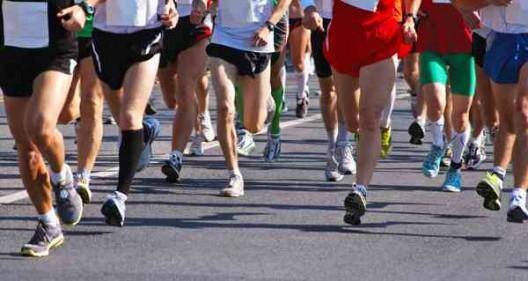
As fluid is lost, important electrolytes like sodium are also lost along with it.

When the body loses fluid through sweat and lung expiration, blood volume drops, putting more pressure on the heart to effectively circulate nutrients and oxygen to the working muscles. In addition to carbohydrates, it is also important to consider fluid requirements to remain well hydrated along the course. 2 In general, recommendations for marathon training range from 6-10 grams of carbohydrates per kilogram (g/kg) of body weight per day 4 - a target that not all athletes reach due to lack of knowledge or inadequate meal preparation. The recommended amount of carbohydrates to consume leading up to the race varies from person to person based not only on an individual’s weight, but also on factors outside of training, such as lifestyle activities, fitness level, body composition, and environmental conditions. 1 Eating adequate carbohydrate leading up to the race (to optimize glycogen stores) and ingesting carbohydrates during the race (for immediate energy) are two ways to ensure a sustained pace and successfully make it to the finish line. Because of this, during long training sessions or races, muscles will utilize and ultimately deplete their energy (glycogen) stores. As exercise intensity increases, muscles use more carbohydrates. When running long distances, both carbohydrate and fat are utilized to fuel muscle cells. Ultimately, the depletion of glycogen (stored muscle carbohydrates) and dehydration are limiting factors in endurance exercise, which is when you are looking to go long and hard.

When it comes to sports nutrition, it’s important to understand the why behind specific recommendations. Nutrient Considerations for Marathon Training and Racing So, when should you eat? What should you be eating? And why does it all matter? This article answers the most commonly asked questions around fueling a marathon and offers tips for optimizing your training and performance. Athletes and active individuals alike recognize that nutrition matters to performance, but they commonly fall victim to overly prescriptive or restrictive diets rather than focusing on fuel that truly supports their activity.

Fueling properly can also decrease mental fatigue, prevent dehydration, reduce injury risk and ultimately enhance performance. The foods you eat sustain energy levels during your run and provide the essential nutrients for recover after the stress of a race. Whether you’ve signed up for your first marathon or are working toward a personal record, adequate nutrition while training is crucial to your athletic success. Always seek the advice of a physician or other qualified health provider before beginning any physical fitness or health- and nutrition-related activity. The ideas and suggestions written below are provided for general educational purposes only and should not be construed as medical advice or care.


 0 kommentar(er)
0 kommentar(er)
